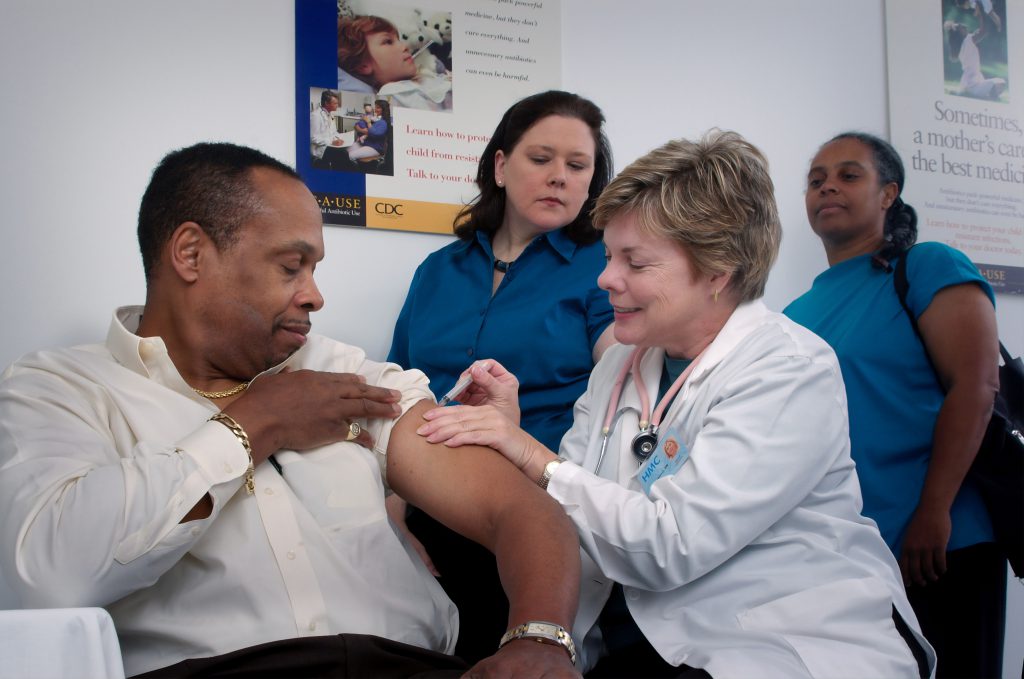
Help Us
do more

You CANNOT Get HIV from Study Vaccines
There is no way to contract HIV or AIDS from the vaccines. All the vaccines are man-made, and do not contain any part of the actual HIV virus. Instead, proteins are manufactured to resemble portions of the virus. Being in a study will not cause HIV or AIDS infection.

Building Blocks for the Future
The synthetic vaccines we use in the studies are simply the building blocks of what one day may be a licensed vaccine. Each study builds on the information from the last to move research and science forward to the ultimate goal of a vaccine that is effective against HIV.
What to Expect

Do good, feel good!
While each study varies, we offer an average of $750 to any subject taking part in a vaccine study. What’s more, you are contributing towards an HIV-free future, and you’re helping researchers build a foundation for developing other vaccines.

Personal commitment
Your time commitment involves a brief consultation once a month or so, for a period of time between 12 and 18 months. Initial visits and vaccination visits may take an hour or two. Subsequent visits takes roughly 30–60 minutes.
A Typical Visit
STEP 1
A chat with a nurse
STEP 2
Have some blood drawn
STEP 3
Receive a vaccine
(typically 3 per study)
After a vaccine, some people may experience a sore arm at the injection site or flu-like symptoms for 24-48 hours. Many people don’t have any symptoms at all.
When you take part in a study there are always healthcare professionals available to answer your questions in case you are ever concerned about how you are feeling.
We’re Committed
Still unsure about participating?
Your safety is our highest priority. Here is our code of commitment to you:
- We respect individual lifestyles, cultures and rights.
- We do all that is possible to ensure your safety.
- We keep your information confidential.
- We are connected to a variety of community resources and agencies, and can assist you in navigating available resources, as well.
- We keep our volunteers informed about all issues regarding the vaccine studies.
- We make every effort for our vaccine participants to represent the diversity of our community at large.
- We endeavor to make this an enjoyable and pleasant experience. We provide a warm and friendly environment for you.
- We provide interpreters, as needed.
Volunteer FAQ
What is a vaccine trial?
A “clinical trial” is a study conducted by doctors to find out if a new medicine or vaccine is safe and effective when given to people. An HIV vaccine clinical trial is a research study designed to find out how an experimental vaccine against HIV works when it is given to people. Our program is focused on testing vaccines for prevention of HIV, so all of our volunteers are healthy and NOT infected with the virus. Most of our vaccine trials need volunteers who are NOT at high risk of getting HIV. We do this to be able to find out if the vaccine is safe and to learn if it is able to make an immune response in healthy people who are at low risk of actually getting HIV.
Could I be infected with HIV by this vaccine?
No, we do not use vaccines that contain whole HIV, either living or killed so it is impossible to get HIV from the vaccine. All of our experimental vaccines are synthetic (man made) and contain only a limited number of pieces of HIV. The parts of HIV that are important for the virus to cause infection are disabled or not included so it is impossible to become infected by receiving an HIV vaccine. Safety is the number one priority of our research. All our testing to see if the vaccine works is done in the laboratory. At no time will you be exposed to HIV in the study.
Will I receive compensation?
Yes, you will receive compensation for your time and travel. Compensation is typically around $750 and is distributed over the course of the study.
Who should I contact if I want to know more about a study?
We encourage potential volunteers to make use of the eligibility questionnaire. For complete information or to join the trial, contact us at 585-756-2329 (756-2DAY) or hvtu_cer@urmc.rochester.edu.
Are these vaccines safe?
Yes, we are happy to be able to say that we have been testing HIV vaccines for over 20 years and have found all of them to be well tolerated with side effects that are, at worse, similar to other vaccines that your doctor may give you. Even though thousands of volunteers have received HIV vaccines over time, we always watch our volunteers very closely for side effects.
Does everyone in a study receive vaccine?
No. To be able to learn the most from our studies, some participants are given a placebo, which is an inactive substance or substitute, instead of the experimental vaccine. When this is the case, you may not know if you received the vaccine or placebo until the end of the study. This is called a ”blinded” study and allows the researchers to be sure that any effects seen are truly from the vaccine.
Will the vaccine I receive protect me against HIV infection?
No. Although that is the ultimate goal of our work, there is still no vaccine that has been proven to protect against HIV. Therefore, it is essential that you practice the safest behaviors possible. We will talk to you about this at each visit to be sure you know about safe practices if you are having sex or using drugs.
Will I know what vaccine I am receiving?
You will be told about the vaccine that is being studied before you start the study, but only at the end of the study will you find out for sure whether you got the vaccine or placebo.
How long do these studies last?
Generally these studies last about 12-18 months, but some may last longer and a few are shorter. While this sounds like a long time, you will need to come to the clinic only about once a month on the average. Your research nurse will be able to tell you specifically how long your study will last and what your visit schedule will be.
What will happen if I decide I’m interested in participating in a vaccine trial?
When you call the clinic to let us know you’re interested in joining a trial, you will be asked some basic eligibility questions about your general health. If you are healthy and meet these basic eligibility criteria, you will be asked to come in to the clinic to learn more about the trial. A study nurse will explain the trial to you in detail and you will be asked to sign an informed consent (insert link to informed consent section). If you remain interested, you will be asked some more in-depth questions about your health and your sexual behavior and your history of drug and alcohol use. A brief physical exam, some blood tests, and an HIV test will be performed. During your visits, you are encouraged to ask as many questions as you wish. If you are found to be eligible and you decide to join a trial, you’ll be invited to schedule your first vaccination visit.
What is Informed Consent?
Informed Consent is the ongoing process of keeping you informed about the particular trial you are interested in joining. It explains the purpose of the trial, any expected side effects, any possible risks and your rights as a trial participant. Your trial nurse will go over the informed consent in great detail with you before you enter any trial. You must sign an informed consent document before any trial-related procedures are carried out; however, you may ask as many questions as you like both before and after signing the consent form. You may withdraw your consent at any time during the trial by simply telling the trial staff that you want to withdraw consent. If any new information about the vaccine being used in the trial is discovered, you may be asked to sign a new informed consent form to show that you understand the new information and still wish to continue in the study.
Can I back out as a volunteer?
If you join a vaccine study we ask that you do your best to meet the schedule and requirements of the study. If you don’t feel comfortable with this, or if you can’t make all the appointments, talk to your study nurse about it. Often we can be flexible, or alternatively, you may decide that the study is not right for you.
It is important that you know that if you do join a study, you may decide to discontinue your participation in it at any time. However, for the sake of getting reliable results from the study, we want to enroll you only if there is a good chance you will be able to continue until the end.
Will it cost me anything?
The vaccines (or placebo) used in the studies are given free so are the tests and exams you receive throughout the trial. You will receive compensation for your time and travel.
Will I still need my own doctor?
Yes. Joining a vaccine study is not the same as receiving health care. Even while you are participating in a study, it is very important to continue to see your doctor as you would if you were not in the study. The doctors and nurses at the HIV Vaccine Trials Unit are not a replacement for your primary healthcare, although they will be glad to answer any questions you might have. Also, our study doctors would be happy to talk with your regular doctor about your participation in the study.
Who protects me while I am in the trial?
Every institution that conducts medical research involving people as volunteers is required by law to have a Institutional Review Board (IRB). Here at the University of Rochester, our IRB is called the “University of Rochester Research Subject Review Board”, or RSRB. The RSRB is a group of people from various professions who are not connected to the vaccine research and are responsible to protect the rights of people in all studies at the university. The board reviews our studies on a regular basis. In addition, people from the local community can have access to information and can comment upon our studies by joining the Rochester Community Advisory Board. This board is made up of volunteers and interested individuals who are not connected with the studies and provide a second layer of input to us about how our studies may affect the local community.
Who is in charge of the trial?
The National Institutes of Health, provides money to the University of Rochester to conduct these studies and is therefore ultimately responsible for them. However, at every clinic site there is a ‘principal investigator’ who is personally responsible for the research. This person is typically a doctor who has many years of experience conducting clinical trials. Other research staff such as physicians, nurses and nurse practitioners work under the direction of the principal investigator and perform exams, conduct interviews, draw blood, answer questions, and administer the study vaccine to you.
Why join a study?
While there is no direct benefit to a volunteer in an HIV vaccine study, many people volunteer because it gives them an opportunity to directly help fight the AIDS pandemic. Some people volunteer because they have a loved one who is living with or has died of AIDS and they want to do their part. Others want a world free of AIDS for their children. Each reason can be a very personal one and there is no right reason to join.
How do I finally decide?
Get the facts. Talk to the study team to see what will happen during the trial, and what is expected of you. If you still have more questions, we can arrange for you to talk with someone who has been in a study in the past, so you can ask them more about what it is like to be a volunteer.
We also encourage you to talk with your regular healthcare provider about the study and encourage them to call the study site if they have questions about the HIV vaccine research effort in Rochester. Think it over, but be sure to join only when you are completely comfortable with all you’ve learned. Contact us at any time with questions 585-756-2329 (756-2DAY) or hvtu_cer@urmc.rochester.edu.
How long do these studies last?
Generally these studies last about 12-18 months, but some may last longer and a few are shorter. While this sounds like a long time, you will need to come to the clinic only about once a month on the average. Your research nurse will be able to tell you specifically how long your study will last and what your visit schedule will be.
HIV FAQ
What is AIDS?
AIDS occurs when an individual’s immune system is weakened by HIV to the point where they develop any number of diseases or cancers. A T-cell count below 200 is one of the primary diagnostic criterion.
What is the difference between HIV and AIDS?
HIV is the virus that causes AIDS, the most advanced stage of HIV disease. A weakened immune system caused by HIV will allow opportunistic infections (OIs) to develop. A healthy immune system would normally fight these infections while an HIV-weakened immune system is susceptible.
How does someone get HIV?
In the United States, most people get HIV through unprotected sex, including vaginal, anal and oral sex, and through injection drug use. Certain bodily fluids including blood, pre-cum, semen, and vaginal secretions, spread HIV. An HIV infected woman can pass HIV to her baby through pregnancy or delivery, and also through breast milk. According to the U.S. Centers for Disease Control and Prevention (CDC), contact with saliva, tears, or sweat has never resulted in someone getting HIV. You cannot get HIV through casual contact such as hugging or shaking hands.
Is there a cure or vaccine for HIV/AIDS?
At this time there is no cure or vaccine for HIV. However, there are new treatments available that have been found to be highly effective in keeping people healthy longer and in delaying the onset of AIDS.
Is there a link between HIV and other STDs?
According to the Centers for Disease Control and Prevention (CDC), people with other STDs are more likely to become infected with HIV. Having STDs that can cause open sores, such as herpes, is especially risky. STDs that do not cause open sores also pose a threat.
